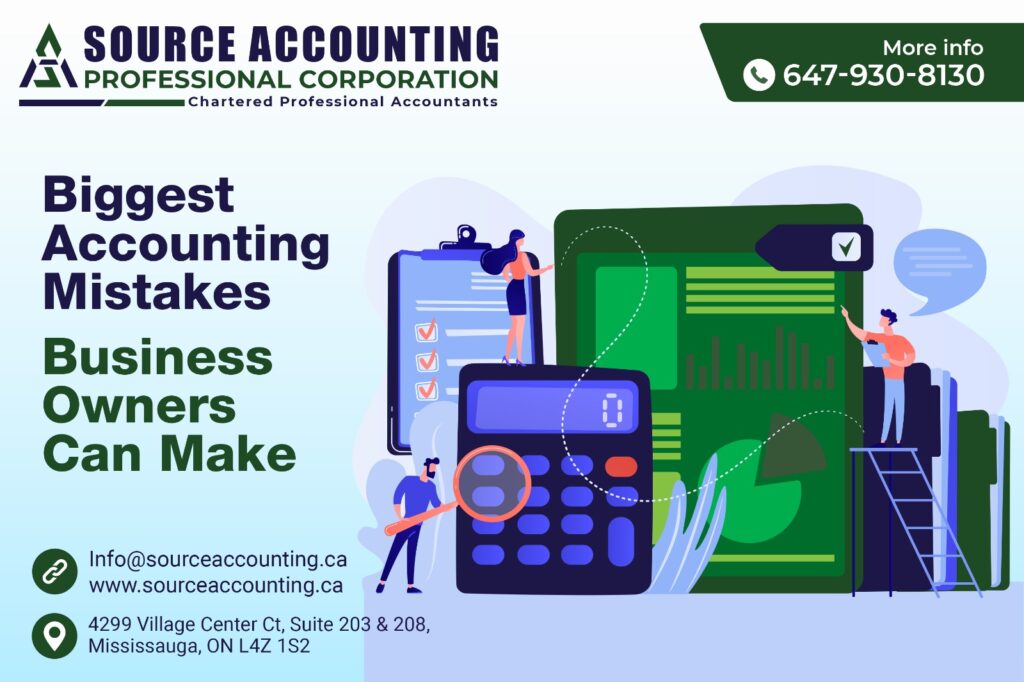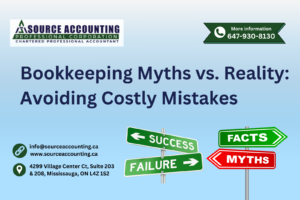Starting a business is an exciting journey that requires dedication, hard work, and smart decision-making. Unfortunately, many small business owners make common mistakes that can negatively impact their business’s success. Even with years of experience, you may be prone to making common accounting mistakes.
Mixing up business and personal transactions:
One such mistake is using your business account for personal purchases. It’s important to have separate accounts for personal and business finances, but even with separate accounts, it’s easy to accidentally use the wrong card. In such cases, it’s best to make a clear note of the transaction so that your bookkeeper can categorize it correctly. However, it’s always better to avoid this mistake altogether as it can complicate tax season for your business and accountant.
Not Keeping Track of Finances:
Many business owners make the mistake of not keeping track of their finances. Accurate record-keeping is essential for financial stability and growth. Keep track of accounts receivable and accounts payable and aim to collect payments quickly and pay liabilities on the due date. Without knowing your business’s financial situation, it’s impossible to make informed decisions about future investments, budgets, and strategies.
Receipts of Expenses:
Failing to keep receipts is a common mistake that business owners make, and this can have serious consequences when it comes to accounting for your business expenses. Use a designated place or a digital app to store receipts.
Without receipts, it can be challenging to maintain accurate records of your business expenses. Additionally, it’s essential to note that the Canada Revenue Agency (CRA) requires you to retain copies of your receipts for six years after the end of the year in which the transaction occurred. Remember bank or credit card statements are not receipts if you are audited by the CRA.
Focusing on Sales Instead of Profit:
Small business owners often make the mistake of focusing solely on sales rather than profit. While it may be satisfying to see money coming in, it’s important to track profits as well. Sales and profits are two different things, as profits take into account the expenses required to make a sale. To be a successful business owner, it’s crucial to be aware of the profit margins on each item and to calculate prices accordingly. Simply setting a price without considering the profit margin can lead to financial troubles for any business.
Failing to Adapt to Change:
In today’s fast-paced business environment, failing to adapt to change can be fatal to a small business. Business owners need to be aware of changing market trends and adapt their strategies accordingly to remain relevant and competitive.
Doing Yourself too Much:
Small business owners or entrepreneurs often make the mistake of trying to handle everything themselves. However, this approach can be detrimental to the success of the business. When your attention is divided among multiple tasks, it becomes challenging to catch every mistake. Instead, focus on the areas where you excel, and seek assistance for the rest. Asking for help is not a sign of weakness or foolishness, rather a smart and wise decision.
In-House Accounting:
Small businesses may try to save costs by managing all their accounting in-house, but this can be a mistake if the person handling the books is not trained in accounting or bookkeeping. While a bookkeeper may seem like an unnecessary expense, they can actually save you money in the long run. They can work closely with your accountant to identify hidden tax deductions and catch potential bookkeeping errors. Therefore, consider hiring a professional bookkeeper as this can be an investment that pays off in the future.
Data loss and no backups:
In today’s world of technology, it’s easy to overlook the importance of having backup files. Many assume that saving data on a computer is sufficient, but technology can fail. Not having a backup of financial data can lead to frustrating and potentially harmful consequences. To avoid this, it’s best to ensure that financial data is backed up on another computer, in the cloud, or even on paper. Our recommendation is to use highly secure cloud accounting solutions.
In conclusion, starting a business requires dedication, hard work, and smart decision-making. By avoiding these common mistakes, business owners can increase their chances of success and achieve their long-term goals.
Disclaimer: The above contents are provided for general guidance only, based on information believed to be accurate and complete, but we cannot guarantee its accuracy or completeness. It does not provide legal advice, nor can it or should it be relied upon. Please contact/consult a qualified tax professional specific to your case.
![Heaader1SourceAccount[3148]](https://sourceaccounting.ca/wp-content/uploads/2021/11/Heaader1SourceAccount3148-2048x289.png)




